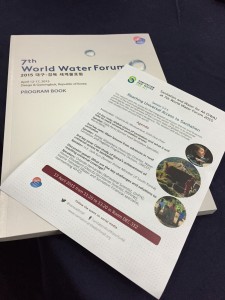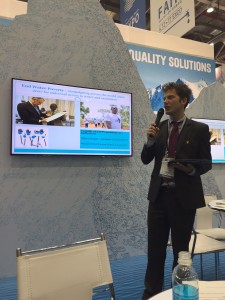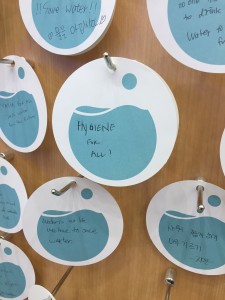Event Summary: Daegu Day One – First Impressions of World Water Forum 7
April 13, 2015
 This blog is the first in a series of daily updates on handwashing at the World Water Forum 7 happening this week in South Korea. Our PPPHW Deputy Secretariat Director, Hanna Woodburn is on the ground, listening to current discussions, learning about innovations, calling for attendees to raise a hand for hygiene, and bringing you the latest in handwashing from Daegu.
This blog is the first in a series of daily updates on handwashing at the World Water Forum 7 happening this week in South Korea. Our PPPHW Deputy Secretariat Director, Hanna Woodburn is on the ground, listening to current discussions, learning about innovations, calling for attendees to raise a hand for hygiene, and bringing you the latest in handwashing from Daegu.
Day 1
I arrived early this morning at the rainy EXCO center in Daegu, Korea unsure of what to expect. I’ve attended a number of conferences before, but this is my first of this magnitude. Spanning two cities, the World Water Forum is a behemoth. The convention center feels like a small, very water-focused city. And yet, even while picking up my conference badge I ran into some friendly faces.
The morning began with my participation in the Sanitation and Water for All’s session on achieving universal sanitation. My message: that universal sanitation is incomplete without hygiene – read more on this in my blog for the SWA Partnership. While listening to the presenters at this session I was struck by how much behavior change undergirds such a significant part of progress in the WASH sector. As hygiene promoters, we spend a great deal of time and effort talking about behavior change, and it was nice to see our colleagues who focus on sanitation do the same. In his portion of this session, Eddy Perez, former Lead Sanitation Specialist at the World Bank, put forth this question: “Are we ready to meet the goals set by the sector?” I think that the overwhelming answer is that yes we are – or at least we hope we are, but challenges remain. Certainly I would argue that we must better integrate hygiene into water and sanitation projects if we hope to truly achieve these goals and objectives for sanitation.
In addition to discussion about behavior change, the importance of reducing inequities for the most vulnerable was another key theme in this session. Progress has been made on water and sanitation, but services simply aren’t being delivered to those which are more difficult to reach. The same is true for hygiene. We know that those who live in rural areas, are poorer, and have less educated heads of households are less likely to have access to functioning handwashing stations than their urban, wealthier, and better educated countrymen. Eliminating these inequities must become a priority post-2015.
In the afternoon, End Water Poverty launched their proposed indicators for the Sustainable Development Goals. This proposal looks similar to those put forth by other organizations, but it was particularly good to see the mention of hygiene in this proposal. Specifically, EWP calls for an indicator measuring the percentage of schools and hospitals with safely-managed water, sanitation and hygiene services. The WHO’s recent report on WASH in healthcare facilities found that 35% of over 66,000 healthcare facilities in 54 countries did not have soap and water for handwashing, so clearly this indicator is very much needed.
Finally, I sat in on a session hosted by the World Bank about pricing. This might seem like an odd agenda item for someone such as myself, but I found the discussion to be fascinating. Water is essential to handwashing. While handwashing doesn’t require a great deal of water and it doesn’t have to be of drinking water quality, water scarcity does present a challenge to turning handwashing behavior into a habit, both inside and outside the household. It is for this reason that I think we as a sector need to think more systemically about our work. The life cycle of water, sanitation, and hygiene access and use is interconnected in myriad ways. These are issues that we as a sector need to be educated on and about which we need to think critically.
I’m looking forward to spending the next four days doing just that. To follow along with more frequent and verbose updates, be sure to follow us on Twitter @HandwashingSoap. Otherwise, check back here tomorrow for another blog summary.


